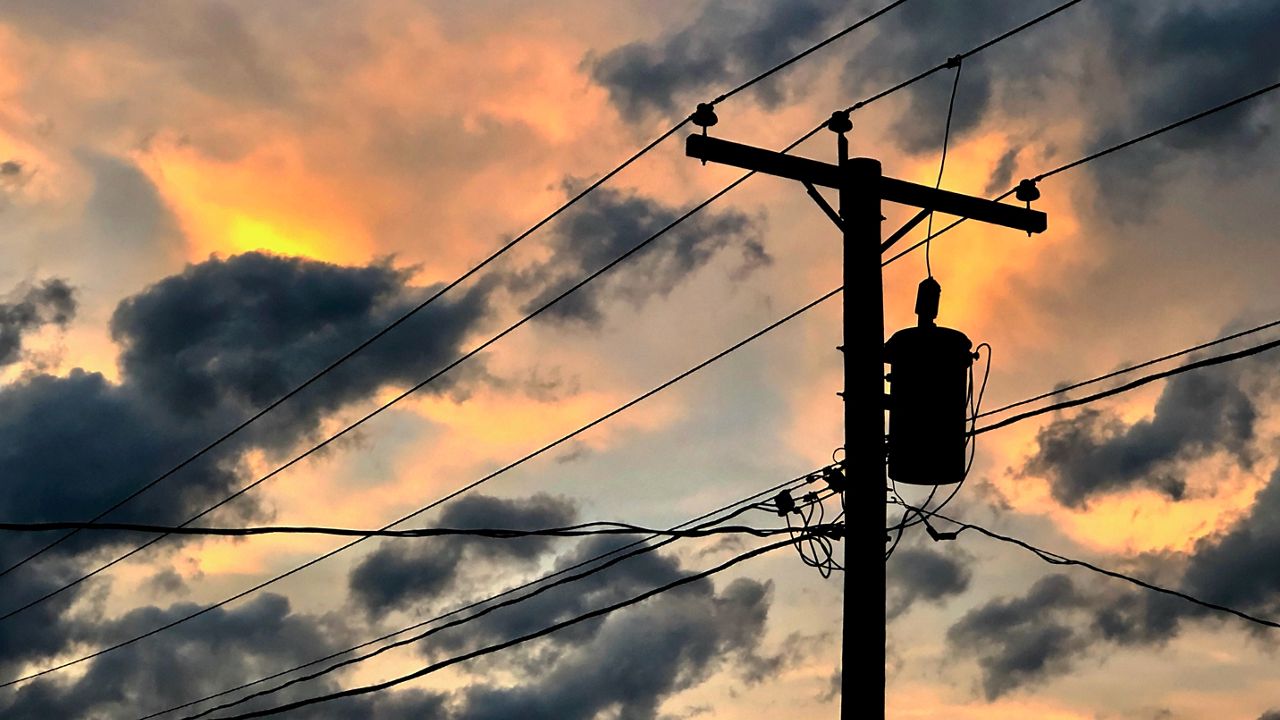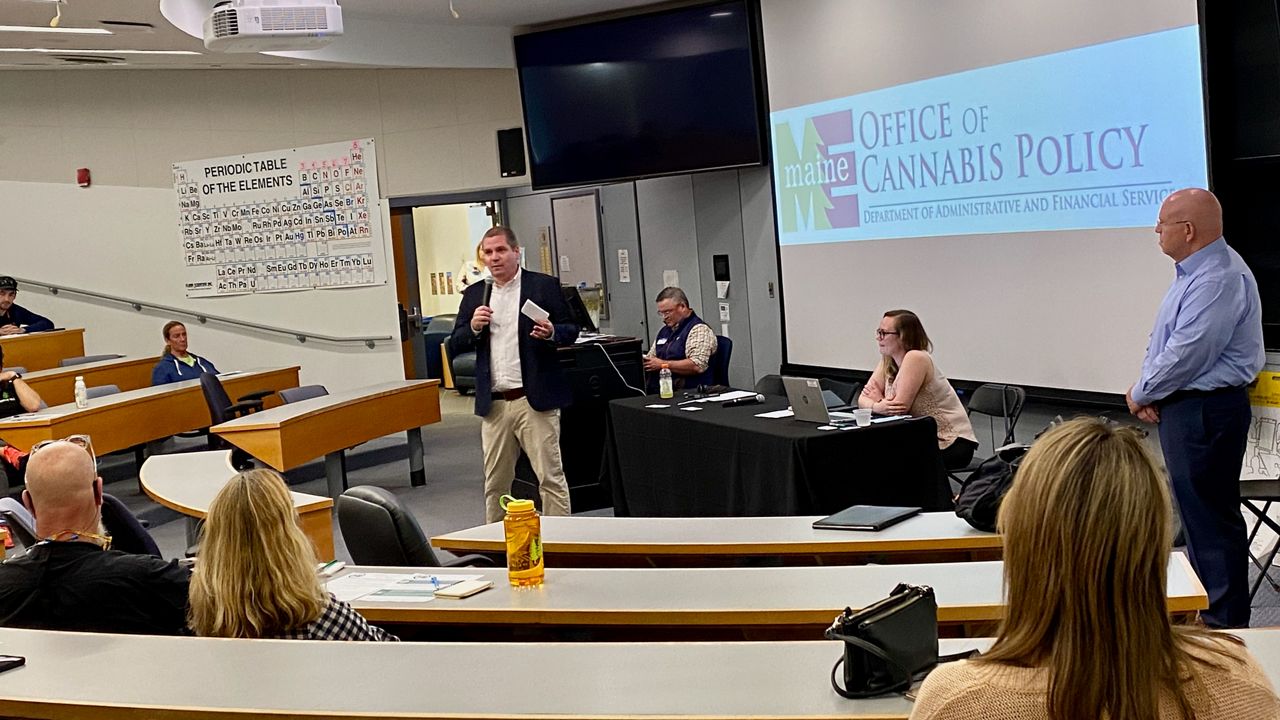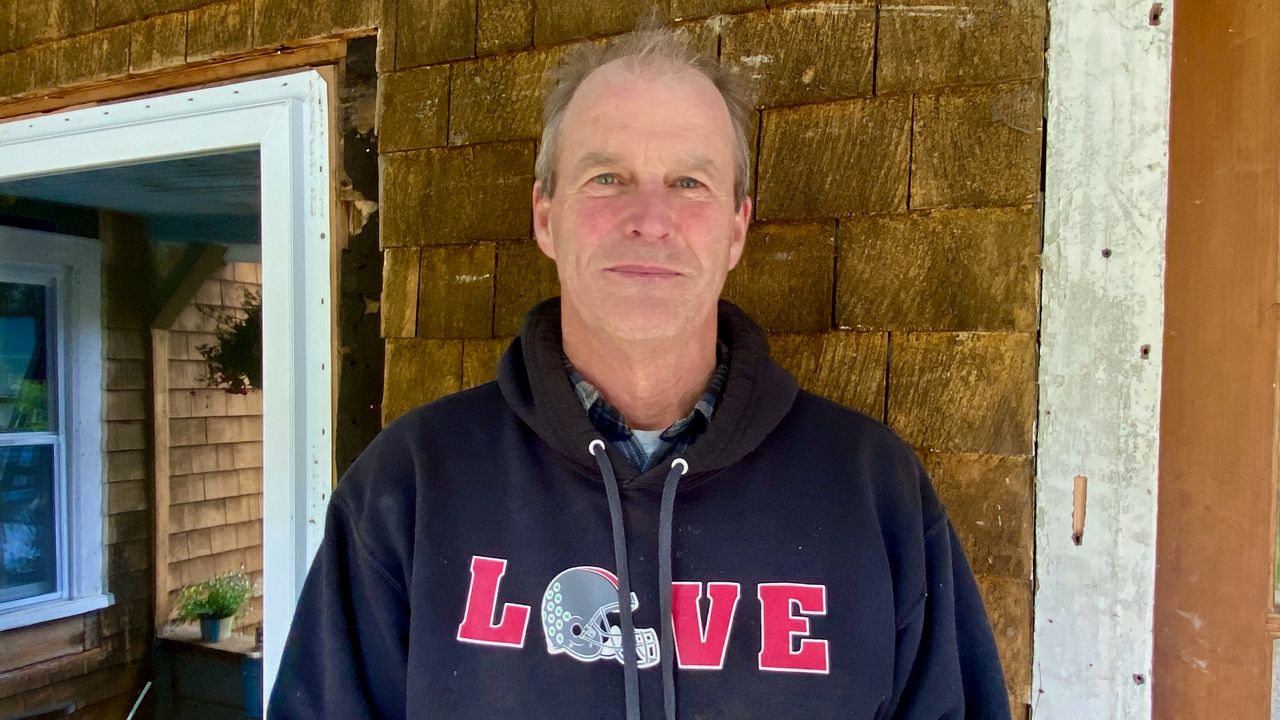Lawmakers and activist groups are inching toward compromise on Gov. Janet Mills’ plan for new accountability rules to tighten the screws on Maine’s controversy-plagued electric utilities.
The legislature’s energy committee split three ways on how to revise the bill after a public hearing brought out criticism from all corners of the debate over how to improve service, costs, reliability and climate-change readiness at Central Maine Power and Versant Power.
Bowdoinham Rep. Seth Berry, a Democrat and energy committee co-chair, initially planned to co-sponsor Mills’ bill and then, as details emerged, criticized it as too soft on those utilities.
In an interview this week, Berry said he’ll push for revisions he wrote to the governor’s plan when it hits the full House and Senate, but won’t try to kill the legislation:
“If we can take a modest step forward today and then have the conversation about changing the utility business model so it’s not a crazy rigged system,” he said, “we’ll get to that next.”
This debate about the governor’s bill – and different changes proposed to it – are a mark of how state leaders and regulators are working, slowly but surely, to find common ground on the best ways to respond to growing consumer mistrust and dissatisfaction with CMP and Versant.
Both utilities have opposed the bill. CMP declined to comment this week on whether it would support any of legislators’ new versions of it, citing ongoing negotiations on amendments.
In a statement, Versant spokeswoman Judy Long rejected the idea that the utility is plagued with controversy, as CMP has been, and noted her company’s reliability challenges in its rural service territory. Long said Versant is still working to understand the “potential impacts” of the bill and lawmakers’ proposed changes.
“At Versant Power, we’re up to the challenge of meeting service metrics that are aligned with our customers’ needs and the state’s energy policy goals, and we want to make sure we’re able to meet those metrics while keeping service affordable for those customers,” Long said. “Versant Power expects to be held to a high standard and we’re continuously working to improve service to our customers.”
Berry is behind one amended version of Mills’ bill, but he’s also been campaigning since last year for what he sees as an even stronger plan: to replace the investor-owned utilities altogether with a consumer-owned nonprofit.
Mills vetoed this proposal when it passed the legislature as a bill last year. Now, thousands have signed a petition led by the “Our Power” campaign to put the matter to a public vote on the 2023 ballot.
Mills hasn’t characterized her utility accountability bill as a direct response to the Our Power plan. But the governor’s proposal did require regulators to consider a nonprofit alternative, as part of a new path toward replacing the utilities if they consistently fell short on new standards.
Our Power supporters saw this as a problematic half-measure and urged lawmakers to take it out of the bill.
“We were very clear during the public hearing that a mention of a consumer-owned utility transition, in an incomplete … way that was not fully thought through … could complicate, from a legal perspective, any transition,” said the campaign’s interim executive director Andrew Blunt in a recent interview.
This was one place the legislature’s energy committee agreed: at their work session after that hearing, they removed specific references to a consumer-owned utility from the governor’s bill.
“Our goal was … to decouple the utility accountability bill from the (Our Power) referendum effort,” said Sen. Stacy Brenner, a Scarborough Democrat who sponsored Mills’ bill, “and in the meantime, while that referendum process unfolds – we suspect that could take some years – that we have accountability now for utilities.”
Berry said he feels his consumer-owned utility referendum can stand apart from any version of Mills’ bill that may move forward. “I think that as long as we bring home something real to the voters, that they will appreciate it,” he said.
Berry said the larger concern he’s been working with colleagues to address is whether the governor’s bill will sufficiently pressure the utilities to improve performance.
His amended version of the bill, and the two other versions that members of the energy committee voted for, take different approaches to increasing this pressure:
The governor’s bill and all three new proposed versions of it include a new “report card” process, where the utilities would submit data four times a year on service, reliability and responsiveness to customers, such as the solar developers who have faced long delays in getting new projects online due in part to problems inside CMP.
The Public Utilities Commission would publish the data and grade the utilities’ performance. Too many bad grades, and the PUC could levy fines – the three versions of the governor’s bill take different tacks on those. Lawmakers also split on ways the PUC should audit the utilities’ data.
But they also agreed that the PUC could go a step further and consider potential replacements for a failing utility. The bill and all three versions of it that made it out of committee detail this “divestiture” process, which includes taking proposals for replacements – without specifying a consumer-owned option – and sets criteria for requiring the PUC to choose an alternative.
Berry’s version of the bill adds increased local control as one of those criteria. The other two versions – one that got five Democratic votes and the other four Republican votes, splitting some of the bill’s original sponsors – specify that the outgoing utility could ask for a court review.
Berry’s version also adds a new “franchise limit,” where every 20 years, the PUC would decide whether to renew the utilities' rights to monopolies in Maine based on alternatives found through this new “divestiture” process.
Public Advocate Bill Harwood, who helped write the governor’s original bill as a senior advisor in Mills’ energy office before he took the advocate job earlier this year, said in an interview that he doesn’t think this 20-year clock is necessary.
“I worry that the (utility’s) planning for long-term will be influenced and affected by the fact that it may not be around,” Harwood said. “If it's in the last five or six years of its 20-year franchise … they then are looking at maximizing the value of the utility that may be condemned by the state rather than maximizing the service and the lowest rates.”
All three versions of Mills’ bill specify that Harwood could trigger the process of considering replacing a failing utility regardless of its report card grades. Harwood argued that this new process, as well as “existing law,” would go far enough to hold the utilities accountable.
“It's never been done in 110 years of public utility regulation, but it's there and it's theoretically possible,” Harwood said. “And that should be enough.”
This speaks to the main criticism that people like Berry and the Our Power campaign have levied at Mills’ proposal: They say it mainly restates powers the PUC already has. But Harwood sees real value in the bill, and especially in the version of it that got the most support in committee. And, he argued, it’s good for the legislature to give the PUC specific direction.
“It's one thing to say, back in 1913 when we wrote the original public utility code, that we gave the PUC broad powers and they probably have the authority to do X, Y and Z,” Harwood said. “It's a very different thing to say, in 2022, we're going to pass a law that directs the PUC to exercise those powers in a certain way.”
To him, the most important feature of the bill is the strengthened whistleblower protections for utility workers and contractors who want to report concerns about internal issues at their companies to Harwood’s office, the PUC or legislature.
“We don't know how many whistleblowers will be coming forward, how frequently and with what kind of information,” Harwood said. “But it would only take one or two whistleblowers with some really important information about some things that are going on inside those utilities that are not in the public interest for this bill to be a major benefit to ratepayers.”
He said at the initial public hearing on the bill that his office is already working with a whistleblower, but he did not say what company or even type of utility they work for.
The three new versions of the governor’s bill offer other competing ideas for utility accountability. Berry’s version increases potential fines and would tighten limits on a new audit of differences between a utility’s actual costs and the estimates used to set rates. He would also require the PUC to include a customer satisfaction survey of the utilities in its report card grades.
For Brenner, one of the bill’s original sponsors, the biggest improvement is featured in both Berry’s version and the one that got the most votes in committee. They would require the PUC to write and implement a major new plan for upgrading Maine’s power grid to “transition to a clean, affordable and reliable electric grid,” with an eye toward the state’s climate change goals.
“I don't feel like we have time to wait, to continue to discuss the many right ways (by) which we could achieve decarbonization,” Brenner said. “My farm business needs us to not keep producing more carbon than we need to, and my kids need that outcome as well. So we're not doing anybody in Maine any justice if we're not moving that ball forward.”
Maine aims to reach net-zero carbon emissions by 2045, which will require a transformative shift toward electrification of vehicles and heating systems, as well as major additions of renewables and energy storage.
Click here and scroll to the three files at the bottom for the latest drafts of the amendments to the governor’s bill. Note that committee staff reported after these files were posted that the consumer-owned utility language is slated to be removed from all final drafts of these proposals.
This story was updated Monday with a statement from Versant Power.









